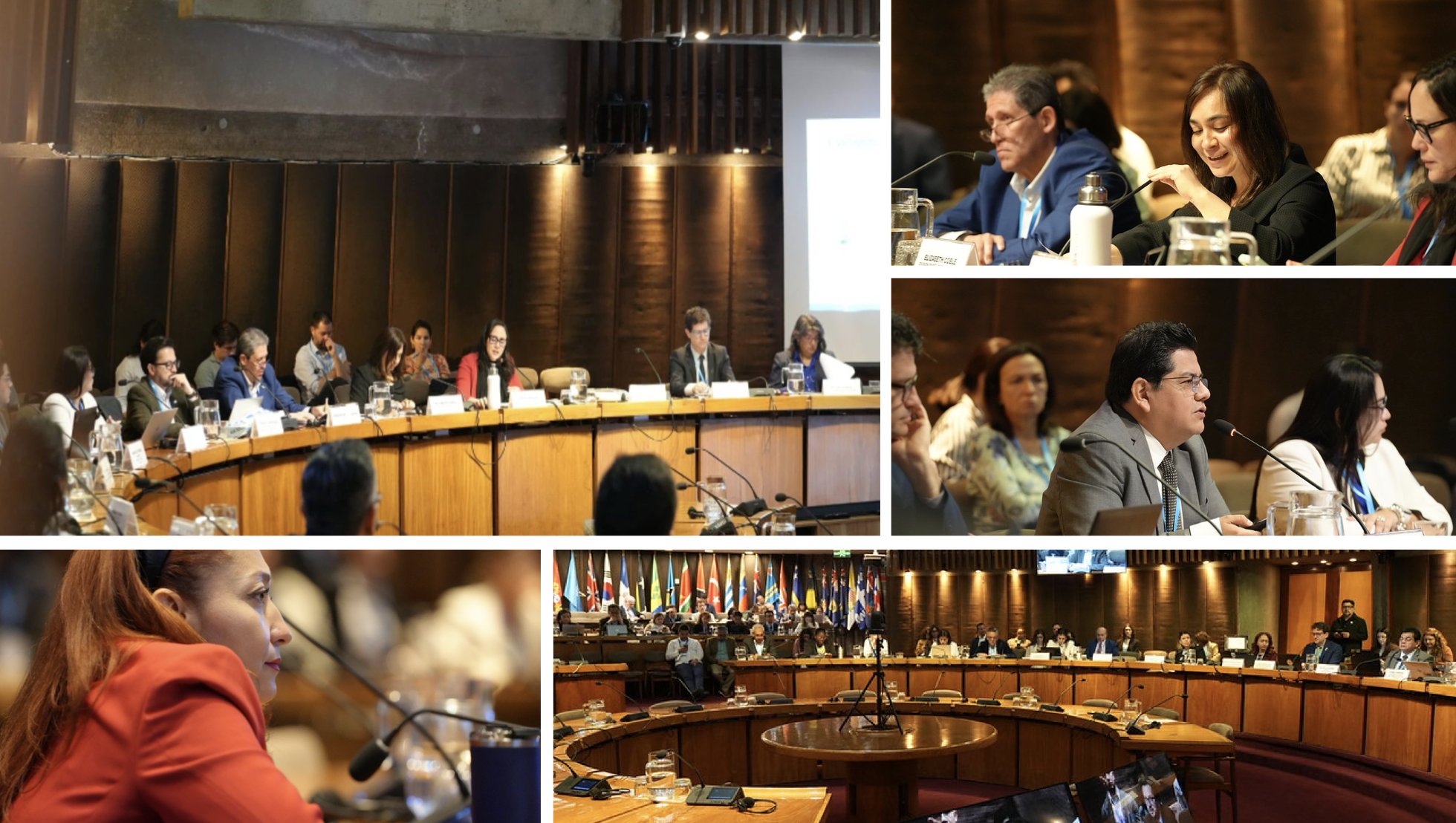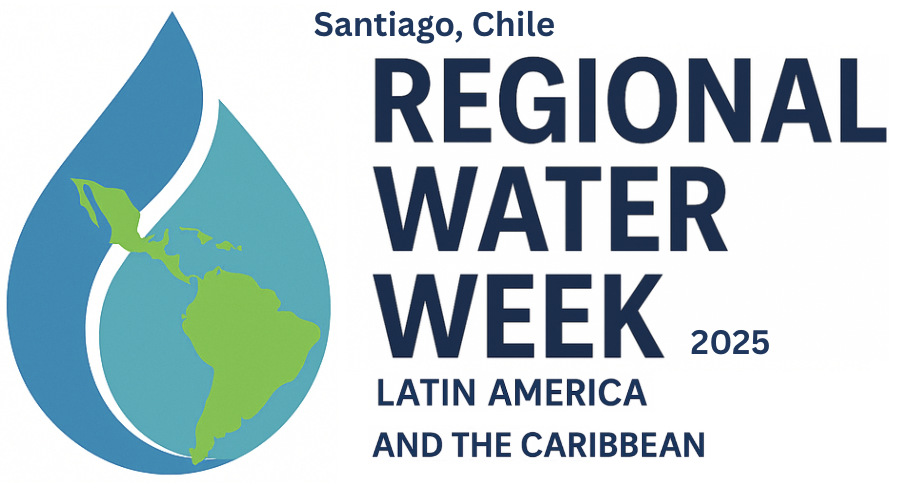V Regional Water Dialogues in Latin America and the Caribbean - Session 1: Valuation of Water and Economic Instruments
Work area(s)
Topic(s)
Dr. Silvia Saravia Matus, Economic Affairs Officer, Head of Water Resources, Natural Resources Division of ECLAC, presented the ECLAC Working Document: “Valuing Water: Reflections and Recommendations for Latin America and the Caribbean.”

In the keynote address, Dr. Saravia emphasized returning to the basics: putting people and territories at the center. This focus is on three fundamental pillars: First, a comprehensive valuation with an equity approach that recognizes the social, environmental, and economic value of water and prioritizes those who need it most. Second, economic instruments that send the right signals —tariffs, charges, incentives, and standards—to reflect scarcity, promote efficiency, and finance the protection of sources . And third, strong institutional capacities to plan, regulate, oversee, and execute, with open data, intersectoral coordination, and binding participation. Finally, she emphasized that if we articulate these three pillars, water valuation will cease to be a technical exercise and become a State policy that effectively safeguards the human right to water , reduces risks, and attracts sustainable investment to the region.
Roundtable of the session
The roundtable was structured into three blocks, moderated by Ms. Elizabeth Coble of ECLAC's Natural Resources Division.
The panel consisted of representatives from the Public Sector, represented by Peru and the Dominican Republic; then from National Experiences , represented by Costa Rica, Chile, Peru, and El Salvador; and finally, Civil Society and Academia, with representatives from the Tulane Institute and Women in Water in LAC. The panelists' main messages were the following:
Mr. Durich Whittembury (Peru) – Minister of Housing, Construction and Sanitation
The minister framed the session from an institutional perspective: transforming the "United Pact for Water and Sanitation" into a multi-stakeholder, institutionalized space to accelerate universal access and build sustainable governance. He grounded this vision in a roadmap focused on quality and services , a national strategy to reduce Non-Revenue Water (NRW)—currently between 30% and 60% —and the update of the multisectoral WASH policy to 2050 , where the valuation of services is an explicit objective. He closed with a concrete political commitment: to approve the new policy as a legacy and link it with targeted smart subsidies to ensure equity under the human right to water and sanitation.
Mr. Davis Aracena (Dominican Republic) – Vice Minister of Soils and Water
Aracena focused public action on the territory: preserving and restoring water sources with nature-based solutions (soil management, riparian zones, agricultural practices) and inter-institutional coordination . He emphasized the need for information and monitoring to support decisions and highlighted a national milestone: protecting 30% of the territory as a basis for water security and resilience. The approach combines environmental compliance , local training, and technical cooperation for assessment methodologies and improved management.
Mr. José Miguel Zeledón (Costa Rica) – Director of Water (MINAE)
Zeledón described the construction, over two decades, of an architecture of instruments that integrates royalties for use and royalties for discharges with temporary concessions ; all designed on a scientific basis , politically validated, and negotiated by sectors (tourism, agribusiness, drinking water, irrigation, hydroelectric, etc.). The system went from collecting approximately USD 200,000 to 20–25 million , with gradual rules and legal stability despite litigation. A portion of the resources is earmarked for PSA (Spanish acronym for "earmarking") , conservation (SINAC), sewage treatment (annual competitions), monitoring , and education; by strengthening monitoring, its use was 100% free (previously there was a cap). The central lesson: more than the "model," what matters is clear and sustainable rules that survive changes of government.
Mr. Rodrigo Sanhueza Bravo (Chile) – Director General of Water (MOP)
Sanhueza outlines an ongoing structural reform : starting in 2022 , the construction of Strategic Water Resources Plans by basin is required , human supply is prioritized , user organizations are strengthened, and there is a migration to water rights that are "not forever," but temporary , reviewable in light of the water reality. He recognizes investment shortfalls and severe droughts that have put supply at risk, and opens the debate on allocation and redistribution (recovering unused volumes to reallocate them based on water security criteria) and disincentives for hoarding . Desalination appears to be a still limited option—mainly in mining—with room to scale. The focus is on institutionalizing certainties and overcoming judicialization, providing the regulator with tools to make decisions with predictability .
Mr. Mauro Gutiérrez (Peru) – President of ADERASA and SUNASS
Gutiérrez brought the assessment to the realm of user behavior . He argued that while prices convey scarcity, they lose effectiveness when people don't know how much they consume or how much they pay . He presented tools to translate m³ into liters/daily use and compare with the neighborhood , which corrects perceptions and encourages savings. Regarding operational sustainability, he insisted on demonstrating the profitability of reducing ANF and incorporating micro-measurement and benchmarking goals in tariff studies to induce efficiency among providers. He also warned that environmental tariff mechanisms (e.g., MRSEH/MEICE) contribute, but cover only ≈1% of the green gap , so complementary sources and realistic policy design are needed.
Ms. Ethel Cabrera (El Salvador) – President of the Salvadoran Water Authority (ASA)
Cabrera presented a comprehensive and modern framework that recognizes the human right to water and sanitation and water as a finite public good . They created a Water Finance Directorate to verify volumes and collect fees ; although the law granted a year for regularization , people began paying immediately , allowing for collection and regulation while formalization progressed. The participatory design of the fee incorporated coefficients (extreme poverty, physical conditions, type of use, consultative/non-consultative, and social interest ) and differentiated treatment for basic food basket products (eggs, sugar, coffee), mitigating impacts. Part of the collection returns with visible benefits : support for the national operator , rural councils , schools , and health units , strengthening social acceptance and creating a citizen oversight network . He pointed out the challenges of gradualness (prioritizing sectors) and measurement (especially for informal providers), and the importance of a water information and continuous improvement system for real-time decision-making.
Mr. Christopher Dalbom (Tulane Institute on Water Resources Law & Policy, USA)
From a legal and institutional perspective, Dalbom advocated for laws that balance flexibility and predictability , engage with science and protect it from political ups and downs , ensuring the priority of the human right to water and inter-agency coherence . He emphasized the need for a water authority with high technical capacity to support decisions in the face of litigation and anticipate emerging pressures. He raised two bottlenecks: scaling pilots to policy by default (updating rights and organizing prioritization strengthens sustainability and resilience) and closing the science-law gap , where robust evidence does not always translate into effective regulations. As an example, he noted that in Louisiana, a cross-cutting veto exists to align decisions with coastal protection plans, but it is not used due to political costs. The final lesson: it is not enough to have the right rule; it must be applied and sustained over time .
Dalbom warned that the expansion of data centers and computing-intensive technologies significantly increases water and energy consumption , often with tax breaks and public infrastructure expansions that socialize costs . If connected to urban networks, they put pressure on health systems ; if not, they extract large volumes of groundwater with private wells that in many states do not pay , shifting water risk to third parties. The current framework rests on a "legal fiction" : protection is ex post via litigation (e.g., farmers with dry wells ), rather than preventive safeguards . He urged ex ante regulations that internalize the water footprint of AI and other transition technologies (e.g., biofuels, lithium ), avoiding privatizing benefits and socializing impacts .
Women in Water LAC – Marisa Mar Pecero
She proposed starting from a "water ethic" : recognizing the existence of others , their values and needs , and anchoring participation in principles and legal frameworks (participation, equality, prior consultation). She asserted the hydrological unity of the basin to understand the hydrosocial cycle and identify uses/users and their relationships ; the HRWS comes first , and the "environmental user" supports the others. She called for including beliefs, values, perceptions, and emotions in diagnoses , with stakeholder maps to avoid exclusions and discover solutions. She recalled the four groups of ecosystem services , including the cultural dimension —what is invaluable should not always be quantified , but should be recognized— ; she cited RARE's PRIDE campaigns as precursors to behavioral science ; and she called for a shift from consultation to co-management in basin organizations, with informed participation . She concluded by mentioning that caring for water is sacred ; our hands "weave and carve paths so that springs may flow."
Photos from the session: https://www.flickr.com/photos/cepal/albums/72177720329507210
Event agenda: AGENDAS - Google Drive
Related content

Regional Water Week for Latin America and the Caribbean – Santiago, Chile 2025
The Economic Commission for Latin America and the Caribbean (ECLAC), together with the Conference of Ibero-American Water Directors and Authorities (CODIA) and the Government of Chile, through the…
Country(ies)
-
Chile